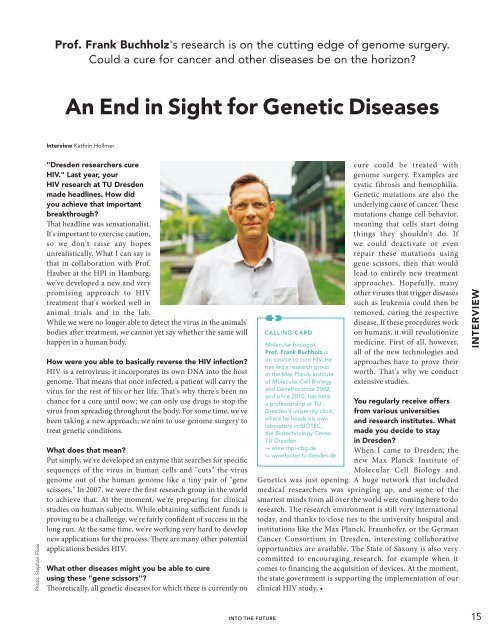Innovative Saxony
Into the future! A magazine of remarkable ideas and valuable networks
Into the future! A magazine of remarkable ideas and valuable networks
You also want an ePaper? Increase the reach of your titles
YUMPU automatically turns print PDFs into web optimized ePapers that Google loves.
Prof. Frank Buchholz's research is on the cutting edge of genome surgery.<br />
Could a cure for cancer and other diseases be on the horizon?<br />
An End in Sight for Genetic Diseases<br />
Interview Kathrin Hollmer<br />
Photo: Stephan Floss<br />
"Dresden researchers cure<br />
HIV." Last year, your<br />
HIV research at TU Dresden<br />
made headlines. How did<br />
you achieve that important<br />
breakthrough?<br />
That headline was sensationalist.<br />
It's important to exercise caution,<br />
so we don't raise any hopes<br />
unrealistically. What I can say is<br />
that in collaboration with Prof.<br />
Hauber at the HPI in Hamburg,<br />
we've developed a new and very<br />
promising approach to HIV<br />
treatment that's worked well in<br />
animal trials and in the lab.<br />
While we were no longer able to detect the virus in the animals'<br />
bodies after treatment, we cannot yet say whether the same will<br />
happen in a human body.<br />
How were you able to basically reverse the HIV infection?<br />
HIV is a retrovirus; it incorporates its own DNA into the host<br />
genome. That means that once infected, a patient will carry the<br />
virus for the rest of his or her life. That's why there's been no<br />
chance for a cure until now; we can only use drugs to stop the<br />
virus from spreading throughout the body. For some time, we've<br />
been taking a new approach; we aim to use genome surgery to<br />
treat genetic conditions.<br />
What does that mean?<br />
Put simply, we've developed an enzyme that searches for specific<br />
sequences of the virus in human cells and "cuts" the virus<br />
genome out of the human genome like a tiny pair of "gene<br />
scissors." In 2007, we were the first research group in the world<br />
to achieve that. At the moment, we're preparing for clinical<br />
studies on human subjects. While obtaining sufficient funds is<br />
proving to be a challenge, we're fairly confident of success in the<br />
long run. At the same time, we're working very hard to develop<br />
new applications for the process. There are many other potential<br />
applications besides HIV.<br />
What other diseases might you be able to cure<br />
using these "gene scissors"?<br />
Theoretically, all genetic diseases for which there is currently no<br />
CALLING CARD<br />
Molecular biologist<br />
Prof. Frank Buchholz is<br />
on course to cure HIV. He<br />
has led a research group<br />
at the Max Planck Institute<br />
of Molecular Cell Biology<br />
and Genetics since 2002,<br />
and since 2010, has held<br />
a professorship at TU<br />
Dresden's university clinic,<br />
where he heads his own<br />
laboratory in BIOTEC,<br />
the Biotechnology Center<br />
TU Dresden.<br />
www.mpi-cbg.de<br />
www.biotec.tu-dresden.de<br />
cure could be treated with<br />
genome surgery. Examples are<br />
cystic fibrosis and hemophilia.<br />
Genetic mutations are also the<br />
underlying cause of cancer. These<br />
mutations change cell behavior,<br />
meaning that cells start doing<br />
things they shouldn't do. If<br />
we could deactivate or even<br />
repair these mutations using<br />
gene scissors, then that would<br />
lead to entirely new treatment<br />
approaches. Hopefully, many<br />
other viruses that trigger diseases<br />
such as leukemia could then be<br />
removed, curing the respective<br />
disease. If these procedures work<br />
on humans, it will revolutionize<br />
medicine. First of all, however,<br />
all of the new technologies and<br />
approaches have to prove their<br />
worth. That's why we conduct<br />
extensive studies.<br />
You regularly receive offers<br />
from various universities<br />
and research institutes. What<br />
made you decide to stay<br />
in Dresden?<br />
When I came to Dresden, the<br />
new Max Planck Institute of<br />
Molecular Cell Biology and<br />
Genetics was just opening. A huge network that included<br />
medical researchers was springing up, and some of the<br />
smartest minds from all over the world were coming here to do<br />
research. The research environment is still very international<br />
today, and thanks to close ties to the university hospital and<br />
institutions like the Max Planck, Fraunhofer, or the German<br />
Cancer Consortium in Dresden, interesting collaborative<br />
opportunities are available. The State of <strong>Saxony</strong> is also very<br />
committed to encouraging research, for example when it<br />
comes to financing the acquisition of devices. At the moment,<br />
the state government is supporting the implementation of our<br />
clinical HIV study. •<br />
INTERVIEW<br />
INTO THE FUTURE<br />
15
















